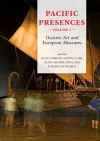
Pacific Presences (volume 1)
5 contributors - Paperback
£45.00
Lucie Carreau is a researcher based at the Museum of Archaeology and Anthropology (MAA), University of Cambridge. Educated at the École du Louvre (Paris) and Sainsbury Research Unit (Norwich), her work focuses on the history of collecting and collections in the19th century and early 20th century and the role of objects in mediating relationships between Pacific Islanders and European visitors. She previously worked as a researcher on the ‘Artefacts of Encounter’ project (2010-2011, ESRC) and ‘Fijian art’ project (2011-2014, AHRC) at MAA, where she co-curated the exhibition Chiefs & Governors: Art and Power in Fiji (2013-2014). Dr. Alison Clark is a Research Associate at the Museum of Archaeology and Anthropology, University of Cambridge. She currently works on the ERC funded Pacific Presences project. Both her masters (2007) and PhD (2013) theses on the Indigenous Australian collections of the British Museum drew on the work of Anthony Forge. Her current research is focused on Kiribati, where she is interested in the contemporary resonance of historic museum collections, and the revival of certain cultural practices. She has previously worked on projects at the British Museum, and the October Gallery in London. Key publications: 2014, ‘What Happens Next? Sustaining Relationships Beyond the Life of a Research Project’, Journal of Museum Ethnography, No.27. 2013, ‘Eliciting a History, Reflections on a Photograph Album’, in Adams, Burt, Bonshek, Bolton and Thomas (eds.) Melanesia Art and Encounter 2013 pp.64-66. Alana Jelinek is a practising artist, exhibiting nationally and internationally for over 25 years. She works in a wide range of media, including participatory, film, sound, novel-writing and painting. From 2009 until 2017 she worked with the Museum of Archaeology and Anthropology, University of Cambridge, first as Arts and Humanities Research Fellow (2009-2014) and then as Senior Researcher for Pacific Presences (2013-2018), making site-specific work and responding to the collections and their histories in order to explore legacies of colonialism. She has written on art for the Journal of Social Anthropology, Ethnos and the International Encyclopedia of Anthropology, and her monograph ‘This is Not Art’ (2013) theorises the discipline of art from the perspective gained through her years with the Museum. She is currently Fellow of Art and Public Engagement with the University of Hertfordshire. Erna Lilje pursues the idea that collections can reveal more about the people who made and used the artefacts they hold by bringing to bear an interdisciplinary approach that combines a close examination of these with field-based research. She believes that the most quotidian objects can offer insights into the lives of those people least represented in historical sources, such as women. Erna’s interest in the physicality of artefacts, and the processes used to make them, stems from her art practice and her focus on Papua New Guinea has foundations in her own heritage. Prof. Dr. Nicholas Thomas was an undergraduate at the Australian National University from 1979 to 1982; his BA (Honours) thesis, on Fijian politics, was supervised by Anthony Forge. He visited the Pacific first in 1984 to undertake doctoral research in the Marquesas Islands and has since written extensively on exploration and cross-cultural encounters and on art histories in the Pacific. He has been Director of the Museum of Archaeology and Anthropology in Cambridge since 2006.